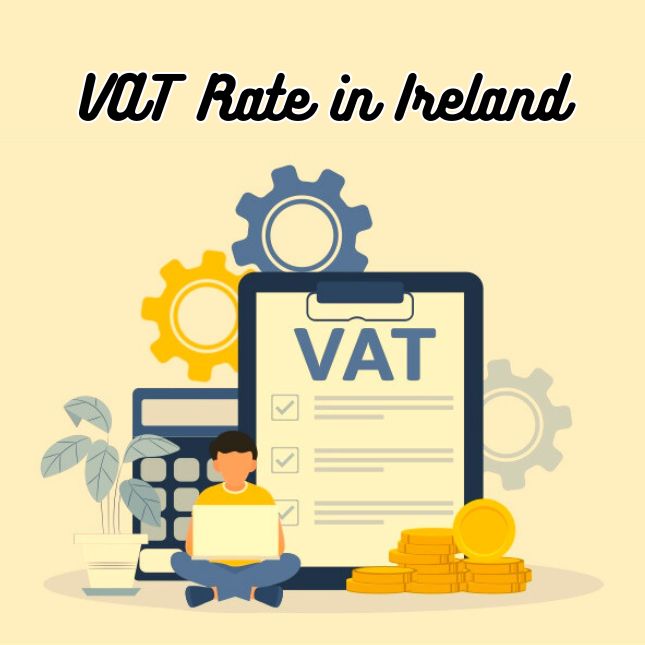Value added tax is an expenditure tax applied to services and goods in many other countries and in Ireland.Understanding VAT rate Ireland is essential for up to date financial reporting and efficient business accounting. VAT is helpful for businesses and individuals alike. This article will reflects on VAT in Ireland, VAT exempt Ireland, its application and tax codes involved, giving clarity for both business and condumers.
What is VAT Tax (Value Added Tax)?
VAT is a tax imposed on every stage of the supply chain, from production to the final sale of goods and services in Ireland. VAT in Ireland is the critical component of revenue collection and affects various sectors, including retail, manufacturing and services industries.
Following is the list of countries where VAT tax is applicable:
- Ireland
- United Kingdom
- Germany
- France
- Italy
- Austria
- Belgium
- Netherlands
- Poland
- Greece.
What are the requirements to Register for VAT
Businesses must register for VAT in Ireland when their turnover crosses the VAT threshold in Ireland, which varies based on the nature of business.
- €37,500 for businesses supplying services.
- €75,000 for businesses supplying goods.
Willful registration is also possible for businesses below the threshold if it befits their operations.
What is TAX point rule in Ireland
In Ireland, the Tax Point Rule is also called the time of supply rule. It plays a very important role in measuring when Value-Added Tax(VAT) becomes due on the supply of goods or services.
This rule ensures that business and Revenue Commissioners accurately determine the correct VAT return Period and the applicable VAT tax.
Key Rules for Tax Points in Ireland
Supply of Goods
The tax point emphasizes the need of contributing to a well-organized and taxes-compliant financial framework.The date when the goods are delivered or made available to the customer.And the on which a VAT invoice is issued, and the payment is received (in whole or in part).
Supply of Services
The tax point is based on the service completion date. The date that a VAT invoice is issued and payment is received (in whole or in part).
Importance of the Tax Point
- It determines the VAT period in which the transaction must be reported.
- It ensures the correct VAT rate is applied (if rates change over time).
- It helps businesses comply with VAT filing and payment deadlines.
Example
A business issues an invoice on 1st October 2023 for services rendered, and the customer pays on 15th October 2023. The tax point is 1st October 2023 (the date the invoice was issued), and the VAT must be included in the VAT return for the period covering that date.
What is the VAT rate in Ireland?
There are different Irish VAT rates applicable depending on the type of goods or services. Most common are these three.
- Standard VAT Rates is the current VAT rate in Ireland and it is 23% which is applicable to most goods and services.
- Reduced rates are 13.5% for items such as electricity, fuel and certain tourism related services.9% reduced rate is for some cultural and entertainment services.
- Zero rate 0% is applied on exports, most food and agricultural supplies and oral medicines.
VAT exemptions in Ireland
There are different goods and services in Ireland that show exemptions from VAT. These exemptions mean that no VAT is charged and businesses cannot reclaim VAT on these services.Some categories of goods and services do not attract VAT.
- Financial and insurance services
- Medical services
- Educational courses
- Books and newspapers (certain types)
- Public transport fares
- Some health and welfare services
What is the impact of VAT on Business in Ireland?
VAT has a considerable impact on business operations, that include pricing strategies and financial reporting.Business must manage VAT properly in order to stay in line with Irish tax rules, avoid charges and keep accurate records for VAT returns.
VAT Services and Compliance
For business to handle VAT registration, reporting and payment, effective VAT services are needed. Accounting professionals frequently help businesses with VAT compliance by giving knowledge on tax laws and management accounting for more efficient operations.
Tax-Free Ireland and VAT Refunds
Non-EU tourists can take advantage of tax-free Ireland shopping initiatives that allow them to recover VAT on qualified purchases. In addition to that firms who overpay VAT can apply VAT tax refunds in Ireland, providing an essential financial knowledge.
Conclusion
Understanding the VAT requirements is important for both business and individuals. Staying up-to-date on the current VAT rate in Ireland helps in easy financial management and sticking to Irish tax codes. Business that uses the appropriate strategy that can easily handle VAT laws.In this way business can contribute to a well-organized and tax-compliant financial framework.
Frequently Asked Question(FAQs)
What is the current/Present VAT rate in Ireland?
The standard VAT rate in Ireland is 23%.
Explain the VAT threshold in Ireland?
The VAT threshold is €37,500 for services and €75,000 for goods.
Are there any goods or services exempt from VAT in Ireland?
Yes, services such as financial, medical, and educational services are VAT exemptions
How can I apply for a VAT refund in Ireland?
You can apply for a refund through the Irish Revenue Commissioners if eligible.
How does VAT impact business management accounting?
Small businesses need to track VAT on sales and purchases, file regular returns, and comply with tax codes in Ireland to avoid penalties. Read More Accounting in Ireland






